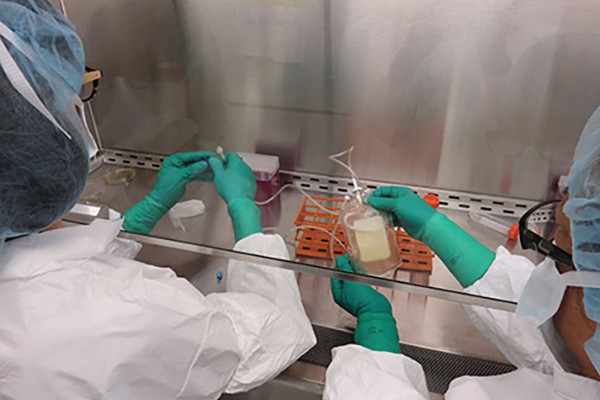Personalized melanoma vaccines marshal powerful immune response
Personalized melanoma vaccines can be used to marshal a powerful immune response against unique mutations in patients’ tumors, according to early data in a first-in-people clinical trial at Washington University School of Medicine in St. Louis. The research is a boost to cancer immunotherapy, a treatment strategy that unleashes the immune system to seek out and destroy cancer.
Vaccines may make war on cancer personal
In the near future, physicians may treat some cancer
patients with personalized vaccines that spur their immune systems to
attack malignant tumors. New research led by scientists at the School of Medicine including senior author Robert Schreiber, PhD, has brought the approach one
step closer to reality.
New center aims to use immune system to fight cancer, other diseases
A new center at the School of Medicine will help scientists use the power of the immune system to fight infections and cancers. The Center for Human Immunology and Immunotherapy Programs is part of BioMed21, Washington University’s initiative to accelerate basic science discoveries into improved diagnosis and treatment for patients.
Some immune cells defend only one organ
School of Medicine scientists have uncovered a new way the immune system
may fight cancers and viral infections. The finding could aid efforts to
use immune cells to treat illness.
DNA sequencing helps identify cancer cells for immune system attack
DNA sequences from tumor cells can be used to direct the immune system to attack cancer, according to Robert Schreiber, PhD, the
Alumni Professor of Pathology and Immunology at Washington University School of Medicine in St. Louis. The research, in mice, appears online Feb. 8 in Nature.
Closing in on a vaccine for breast cancer
Mammograms could more frequently bear good news if researchers develop an effective breast cancer vaccine.Progress toward development of a breast cancer vaccine has been reported by researchers at Washington University School of Medicine and the Siteman Cancer Center in St. Louis. Physicians believe a vaccine-induced immune response could be used to supplement other cancer therapies or to immunize high-risk people against cancer.
Closing in on a vaccine for breast cancer
Mammograms could more frequently bear good news if researchers develop an effective breast cancer vaccine.Progress toward development of a breast cancer vaccine has been reported by researchers at Washington University School of Medicine and the Siteman Cancer Center in St. Louis. Physicians believe a vaccine-induced immune response could be used to supplement other cancer therapies or to immunize high-risk people against cancer.

